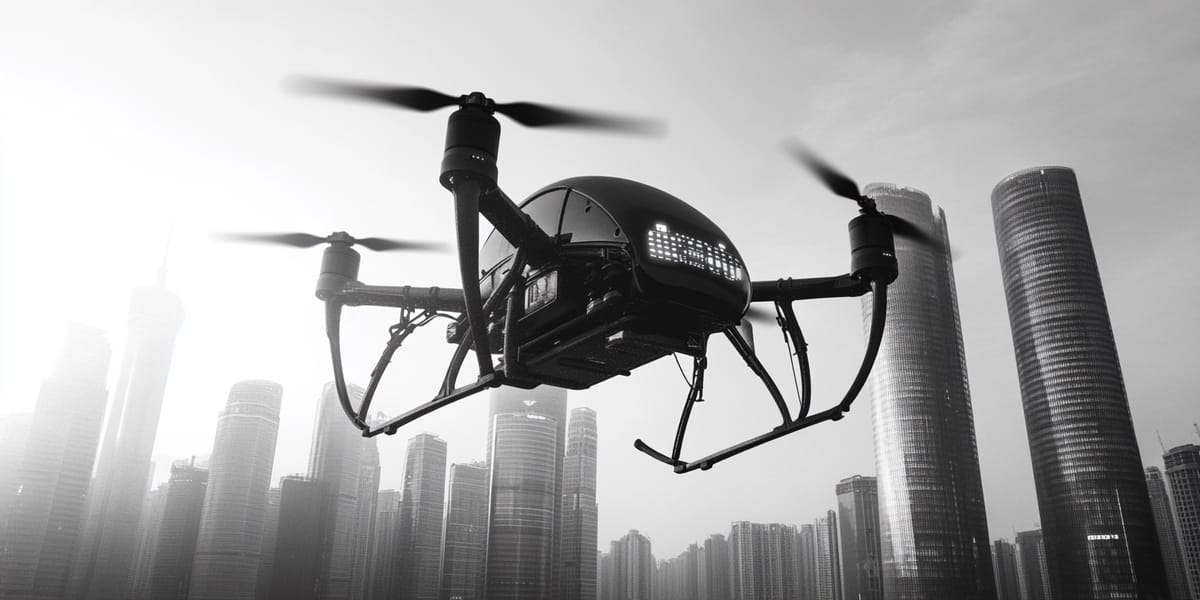China Leads Air Mobility Revolution With Blockchain-Powered Drone Taxis

China has taken a historic step in urban air mobility by issuing the first permits for autonomous passenger drones, with EHang Holdings and Hefei Heyi Aviation receiving Air Operator Certificates from the Civil Aviation Administration of China on March 30, 2025. This regulatory milestone enables both companies to conduct commercial unmanned passenger flights, beginning with tourism and gradually expanding to urban transportation. The certification represents the final regulatory hurdle for these companies after previously obtaining production and airworthiness certifications, positioning China at the forefront of the global air taxi revolution, according to Newsweek.
EHang's Vice President He Tianxing predicts that flying taxis will become a viable transportation method in Chinese cities within the next three to five years. The company's EH216-S, a fully electric, pilotless two-seater aerial vehicle featuring 16 propellers, has already received permission for mass production and will initially offer services in Guangzhou and Hefei for tourism purposes before expanding to broader urban mobility applications, as reported by CNBC.
Blockchain Integration Transforms Air Mobility Payments
As China's low-altitude economy rapidly expands, blockchain technology is emerging as a crucial component for secure and efficient payment systems within the drone taxi ecosystem. Blockchain-based transportation platforms enable vehicles to communicate and transact autonomously, eliminating intermediaries and reducing transaction costs. These platforms create a decentralized network where drones can coordinate services such as passenger transport, charging, and maintenance while processing payments seamlessly through cryptocurrency or digital currency systems, according to DAV Network, a leader in decentralized autonomous vehicle solutions.
The integration of blockchain in drone operations extends beyond payments to address critical security concerns. Researchers have implemented Ethereum blockchain networks to mitigate GPS spoofing attacks on unmanned aerial vehicles, ensuring secure and trustworthy communication between drones and control centers. This innovation is particularly relevant for autonomous passenger drones where navigation security is paramount, as outlined in a study published in ScienceDirect.
Industry experts suggest that China's digital yuan could play a pivotal role in this emerging transportation sector. As China expands its cross-border digital RMB settlement system, which has already connected with ASEAN nations and Middle Eastern countries, the infrastructure exists to integrate e-CNY payments for drone taxi services. The digital yuan offers near-instantaneous settlement times and dramatically reduced fees compared to traditional payment methods, providing an ideal payment solution for the fast-growing low-altitude economy, according to analysis from Proshare.
Market Growth Projections and Investment Opportunities
China's low-altitude economy, which encompasses drone taxis, delivery drones, and helicopter shuttle services, represents one of the country's fastest-growing industries. According to research group Hurun, the sector is projected to be worth 1.5 trillion yuan ($205 billion) by the end of 2025, nearly doubling to approximately 3 trillion yuan by 2035. The government has highlighted this sector in its annual work report for 2025, demonstrating significant political support for its development, as reported by Interesting Engineering.
Other estimates from the Civil Aviation Administration of China are even more optimistic, suggesting the market could reach 15 trillion CNY by 2025 and 35 trillion CNY by 2035. Guangdong Province currently leads in this sector, with Shenzhen and Guangzhou ranking first and second nationally in the number of low-altitude economy enterprises, according to a report from Our China Story.
The unprecedented growth has attracted both domestic and international investors. Chinese companies including traditional automakers like GAC, Geely, and Xpeng are making significant investments in eVTOL technology. Meanwhile, international aerospace giants such as Boeing, Airbus, and Embraer are also competing in this space, creating a dynamic global market with Chinese companies maintaining a technological edge through early regulatory approval and commercial deployment.
International Implications and Regulatory Challenges
China's rapid advancement in both drone taxi technology and blockchain-based payment systems has significant international implications. While China restricts domestic cryptocurrency trading, it has invested heavily in blockchain technology and its central bank digital currency (CBDC). The digital yuan project, coupled with initiatives like the BRICS blockchain payment system reportedly called "BRICS Pay," indicates China's strategic positioning in future global payment infrastructures, including those supporting emerging transportation systems, according to Modern Diplomacy.
The regulatory landscape presents both opportunities and challenges. While China has proactively established rules for unmanned aircraft flight since June 2023, many countries including the United States have yet to implement comparable regulations. The U.S. Federal Aviation Administration has only unveiled general rules for "powered-lift" vehicles, creating a regulatory gap that gives Chinese companies a first-mover advantage in deploying commercial air taxi services globally.
Experts note that successful international expansion of drone taxi services will require interoperable payment systems capable of handling cross-border transactions efficiently. Research from the Federal Reserve Bank of New York suggests that while blockchain technology offers innovative mechanisms for payment interoperability, creating truly global systems will require coordinated legal and institutional frameworks—an area where China's early experience with drone taxi deployment and digital currency implementation could provide valuable insights.
Related Reading on Morrow Report
For more in-depth analysis of how blockchain technology is transforming transportation systems and creating alternative financial infrastructures for emerging technologies like drone taxis, visit Morrow Report. Their comprehensive coverage explores how decentralized payment systems are enabling new business models in autonomous transportation and examines the implications for investors, policymakers, and consumers as these technologies reshape urban mobility.




